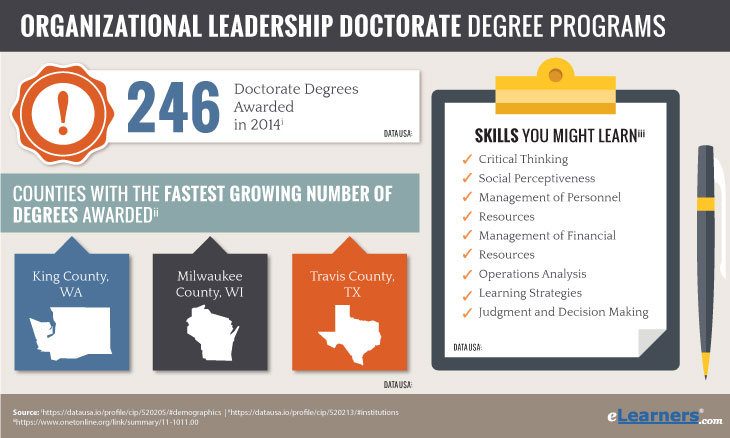PhD programs in leadership provide an unparalleled opportunity for individuals to deepen their understanding of leadership theory and practice, develop advanced research skills, and prepare for leadership roles in various sectors. This comprehensive guide will delve into the intricacies of PhD programs in leadership, exploring their core curriculum, research methods, specializations, career paths, and application requirements.
From understanding the history and evolution of PhD programs in leadership to examining the different types of programs available, this guide will provide a thorough overview of this specialized field of study. We will also explore the research opportunities, faculty expertise, and career paths associated with PhD programs in leadership, empowering you to make informed decisions about your academic and professional journey.
Overview of PhD Programs in Leadership
PhD programs in leadership are designed to prepare individuals for careers in research, teaching, and leadership positions in various fields, including business, education, healthcare, and the nonprofit sector.
The main objectives of PhD programs in leadership are to:
- Develop advanced knowledge and understanding of leadership theories and practices.
- Conduct original research on leadership topics.
- Prepare individuals to teach and mentor future leaders.
- Develop the skills and competencies necessary for effective leadership in complex and changing environments.
History and Evolution
PhD programs in leadership have evolved over time to reflect the changing needs of the business and academic communities. The first PhD programs in leadership were established in the early 20th century, and they were primarily focused on the study of educational leadership.
PhD programs in leadership prepare individuals for advanced roles in organizational leadership and research. For those seeking a more specialized focus, a master’s in educational leadership and administration can provide in-depth knowledge and skills in educational settings. However, PhD programs in leadership offer a broader perspective, equipping graduates with the theoretical foundation and research expertise necessary for leadership roles across various industries and sectors.
In the mid-20th century, PhD programs in leadership began to expand to include other fields, such as business, healthcare, and the nonprofit sector. This expansion was driven by the growing recognition of the importance of leadership in all sectors of society.
Types of PhD Programs in Leadership
There are two main types of PhD programs in leadership: research-based and professional practice-based programs.
Research-based PhD programs in leadership are designed to prepare individuals for careers in research and teaching. These programs typically require students to complete a dissertation that makes an original contribution to the field of leadership.
PhD programs in leadership provide advanced training for individuals seeking to lead and manage in complex organizations. If you’re interested in educational leadership specifically, consider an Ed.S. in Educational Leadership online. This program offers a flexible and affordable way to earn a graduate degree while continuing your career.
Upon completion of an Ed.S. program, you’ll be well-prepared to take on leadership roles in educational settings. However, if your goal is to pursue the highest level of academic achievement, PhD programs in leadership remain the gold standard for advanced study in this field.
Professional practice-based PhD programs in leadership are designed to prepare individuals for careers in leadership positions in various fields. These programs typically require students to complete a practicum or internship in addition to coursework and a dissertation.
Core Curriculum and Research Methods
The core curriculum in PhD programs in leadership typically covers a broad range of topics, including leadership theory, research methods, and organizational behavior. These courses provide students with a solid foundation in the field of leadership and prepare them for conducting original research.
Leadership Theory
Leadership theory courses explore different perspectives on leadership, such as trait theory, behavioral theory, and situational theory. Students learn about the various factors that influence leadership effectiveness and how to apply these theories to real-world leadership situations.
Research Methods
Research methods courses teach students how to design and conduct research studies in leadership. Students learn about qualitative, quantitative, and mixed methods approaches and how to choose the most appropriate method for their research questions. They also learn how to collect and analyze data and interpret their findings.
Organizational Behavior
Organizational behavior courses examine the behavior of individuals and groups within organizations. Students learn about motivation, communication, conflict resolution, and other factors that influence organizational effectiveness. This knowledge helps students understand the context in which leadership takes place and how to effectively lead in complex organizational settings.
Importance of Research Design and Data Analysis
Research design and data analysis are critical components of leadership research. A well-designed study will yield valid and reliable results, while poor research design can lead to misleading conclusions. Students learn how to develop research questions, choose appropriate research methods, and analyze their data using statistical software.
They also learn how to interpret their findings and communicate them effectively to others.
Specializations and Concentrations

PhD programs in leadership offer various specializations and concentrations to cater to the diverse interests and career aspirations of students. These specializations allow students to deepen their knowledge and expertise in specific areas of leadership, enhancing their career opportunities and preparing them for leadership roles in various sectors.
Educational Leadership, Phd programs in leadership
Educational leadership specialization focuses on the theory and practice of leadership in educational settings. Coursework typically covers topics such as educational policy, curriculum development, instructional leadership, and school administration. Graduates with a specialization in educational leadership are well-equipped for leadership roles in schools, districts, and other educational organizations.
Healthcare Leadership
Healthcare leadership specialization prepares students for leadership roles in the healthcare industry. Coursework often includes topics such as healthcare policy, healthcare finance, healthcare operations, and healthcare ethics. Graduates with a specialization in healthcare leadership are well-suited for leadership positions in hospitals, clinics, and other healthcare organizations.
Organizational Leadership
Organizational leadership specialization focuses on the theory and practice of leadership in various organizational contexts, including businesses, non-profit organizations, and government agencies. Coursework typically covers topics such as organizational behavior, strategic planning, change management, and human resource management. Graduates with a specialization in organizational leadership are well-prepared for leadership roles in a wide range of organizations.
Faculty and Research Opportunities
PhD programs in leadership often have a distinguished faculty of experienced scholars and practitioners who are actively involved in research and teaching. These faculty members bring a wealth of knowledge and expertise to the classroom, providing students with a comprehensive understanding of leadership theories, practices, and research methods.
Research Opportunities
PhD students in leadership have access to a wide range of research opportunities, including:
- Collaborating with faculty members on ongoing research projects
- Conducting independent research under the guidance of a faculty mentor
- Partnering with external organizations to apply leadership principles to real-world challenges
These opportunities allow students to develop their research skills, contribute to the advancement of knowledge in the field, and gain valuable experience in applying leadership principles in practical settings.
Mentorship and Networking
Mentorship and networking are essential components of PhD programs in leadership. Faculty members provide guidance, support, and feedback to students throughout their research journey. They help students develop their research interests, refine their research questions, and navigate the challenges of doctoral study.
Additionally, PhD programs often organize networking events and conferences where students can connect with other researchers, professionals, and potential collaborators in the field of leadership.
Career Paths and Outcomes

Graduates of PhD programs in leadership have diverse career paths available to them, leveraging their advanced knowledge and skills. They can pursue roles in academia, research, and leadership positions across various industries.
PhD programs in leadership are designed to provide you with the skills and knowledge you need to be an effective leader in any field. MD Anderson Leadership offers a variety of PhD programs in leadership that can help you develop the skills you need to succeed in your career.
Whether you’re interested in a career in academia, business, or government, a PhD in leadership can help you achieve your goals.
PhD graduates in leadership are highly sought after for their expertise in organizational behavior, strategic planning, and leadership development. They can find employment in:
- Academia: As professors, researchers, and administrators at universities and research institutions.
- Research: In government agencies, non-profit organizations, and private research firms.
- Leadership Positions: In various industries, including healthcare, education, business, and government, holding roles such as CEO, Executive Director, and Senior Manager.
Successful Graduates and Career Trajectories
Many PhD graduates in leadership have achieved notable career success. Here are a few examples:
- Dr. Susan David: Author, psychologist, and Harvard Medical School professor, known for her work on emotional agility.
- Dr. Marshall Goldsmith: Executive coach and author, recognized for his expertise in leadership development.
- Dr. Amy Edmondson: Professor at Harvard Business School, known for her research on psychological safety in organizations.
Earning Potential and Job Outlook
PhD graduates in leadership have strong earning potential and a positive job outlook. According to the U.S. Bureau of Labor Statistics, the median annual salary for top executives was $107,680 in May 2021. The job outlook for leadership roles is projected to grow faster than average in the coming years.
Application Process and Admissions Requirements

Applying to a PhD program in leadership is a competitive process. The application process typically involves submitting a number of materials, including a personal statement, research proposal, letters of recommendation, and transcripts. The admissions committee will evaluate your application based on your academic record, research experience, and potential for success in the program.
Application Deadlines
The application deadlines for PhD programs in leadership vary from program to program. It is important to check with the specific programs you are interested in to find out their deadlines.
Required Materials
- Personal statement
- Research proposal
- Letters of recommendation
- Transcripts
The personal statement is an opportunity for you to tell the admissions committee about your academic and professional goals, and why you are interested in pursuing a PhD in leadership. The research proposal is a brief Artikel of your proposed research project.
The letters of recommendation should come from people who can attest to your academic and research abilities.
Selection Criteria
The admissions committee will evaluate your application based on the following criteria:
- Academic record
- Research experience
- Potential for success in the program
Your academic record should demonstrate that you have the intellectual ability to succeed in a PhD program. Your research experience should show that you have the skills and knowledge necessary to conduct independent research. Your potential for success in the program will be evaluated based on your personal statement, research proposal, and letters of recommendation.
Tips for Preparing a Strong Application
Here are a few tips for preparing a strong application to a PhD program in leadership:
- Start early. The application process can be time-consuming, so it is important to start early to give yourself enough time to gather all of the required materials.
- Do your research. Learn as much as you can about the programs you are interested in. Visit their websites, talk to current students, and attend information sessions.
- Write a strong personal statement. The personal statement is your chance to make a personal connection with the admissions committee. Be sure to highlight your academic and professional goals, and explain why you are interested in pursuing a PhD in leadership.
- Develop a strong research proposal. The research proposal is an opportunity for you to demonstrate your research skills and knowledge. Be sure to choose a topic that you are passionate about and that you have the skills and knowledge to research.
- Get strong letters of recommendation. The letters of recommendation should come from people who can attest to your academic and research abilities. Be sure to ask people who know you well and who can write strong letters on your behalf.
Final Wrap-Up: Phd Programs In Leadership
Whether you aspire to become a thought leader in academia, a transformative leader in the corporate world, or an influential leader in the non-profit sector, a PhD in leadership can provide the knowledge, skills, and network you need to achieve your goals.
With its rigorous coursework, cutting-edge research, and diverse career opportunities, a PhD in leadership is an investment in your future and a catalyst for personal and professional growth.
Questions Often Asked
What are the prerequisites for applying to a PhD program in leadership?
Typically, applicants should hold a master’s degree in a related field, have research experience, and provide strong letters of recommendation.
What are the different types of PhD programs in leadership?
There are two main types: research-based programs that focus on developing advanced research skills and professional practice-based programs that emphasize practical leadership applications.
What are the career opportunities for graduates of PhD programs in leadership?
Graduates can pursue careers in academia, research, and leadership positions in various industries, including education, healthcare, business, and non-profit organizations.